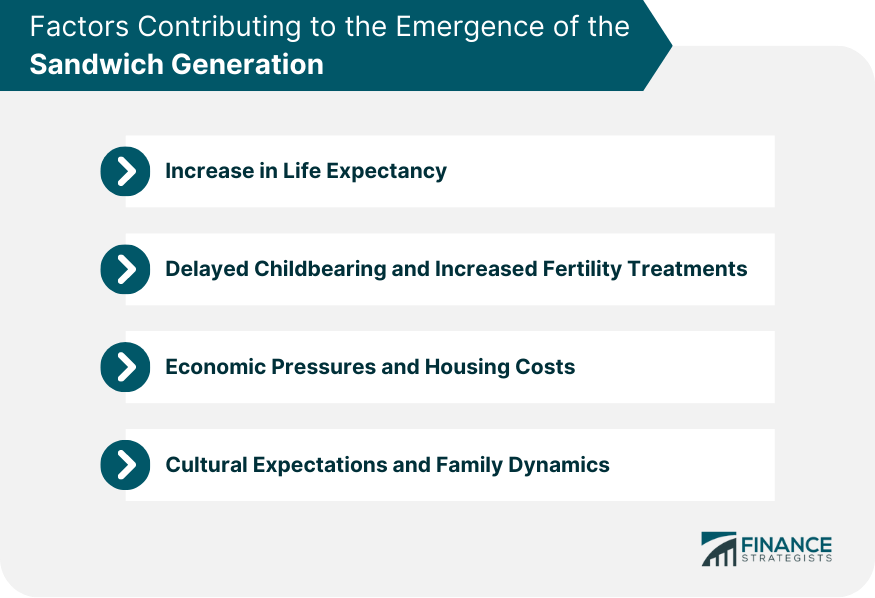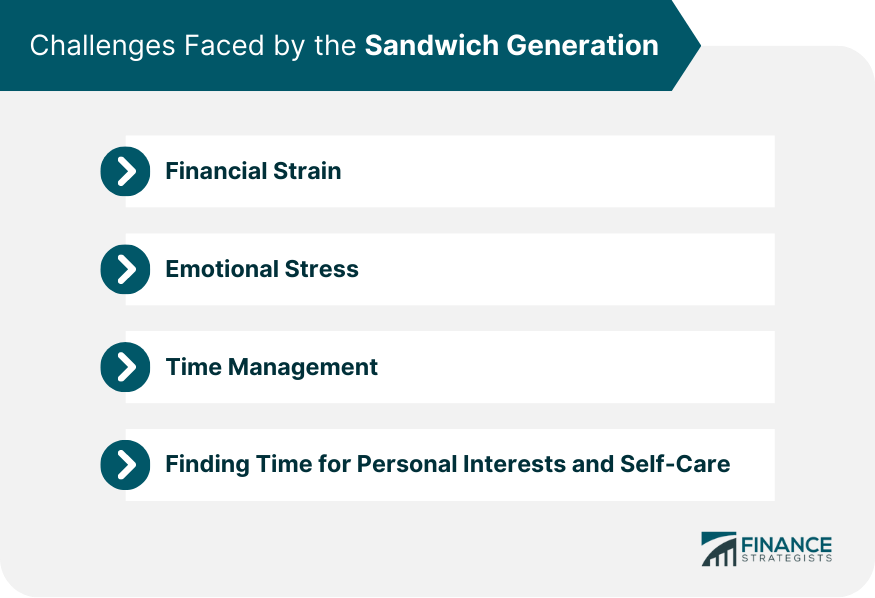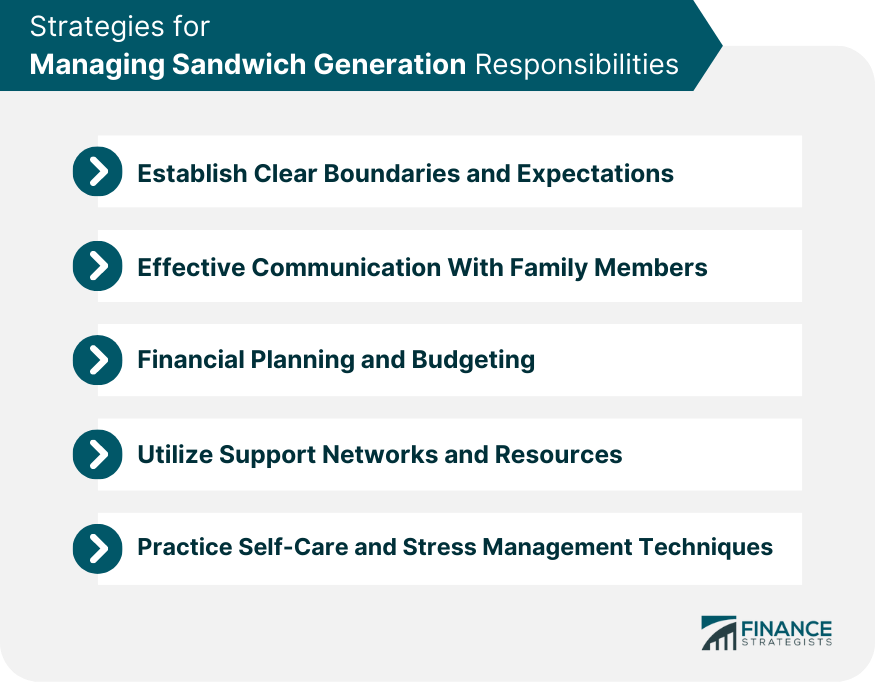The Sandwich Generation refers to a group of individuals who are responsible for caring for both their aging parents and their own children. This generation is "sandwiched" between the needs of two different age groups, creating unique challenges and responsibilities. The prevalence of the Sandwich Generation is increasing due to a variety of factors, such as changing demographics and economic pressures. This phenomenon has significant implications for individuals, families, and society as a whole. Longer life expectancy means that many adults are now caring for elderly parents who are living well into their 80s and 90s. This extended lifespan creates a greater likelihood of overlapping caregiving responsibilities for both parents and children. Many people are choosing to have children later in life, often due to career and educational pursuits. This, combined with advances in fertility treatments, results in a higher likelihood of having children and elderly parents who require care simultaneously. The rising costs of housing and living expenses make it more difficult for adult children to achieve financial independence. As a result, many are staying at home longer or returning to live with their parents, increasing the caregiving burden for their middle-aged parents. Cultural norms and expectations can play a significant role in shaping the responsibilities of the Sandwich Generation. In some cultures, adult children are expected to care for their aging parents, creating additional pressures and obligations. Caring for aging parents often involves significant financial costs, such as medical expenses, home modifications, and long-term care. These expenses can create a considerable financial burden for the Sandwich Generation, making it difficult to balance their own needs and those of their parents. Many Sandwich Generation individuals also provide financial support for their adult children, such as helping with education costs, housing, or living expenses. This additional financial responsibility can make it challenging to save for retirement or meet other financial goals. With the financial strain of caring for both elderly parents and adult children, many Sandwich Generation members struggle to save adequately for their own retirement. This can lead to delayed retirement, insufficient savings, and concerns about their financial future. The emotional toll of juggling the needs of multiple generations can leave Sandwich Generation individuals feeling overwhelmed and exhausted. This stress can have significant impacts on their mental health and overall well-being. Trying to meet the needs of both aging parents and growing children can create a constant balancing act for Sandwich Generation caregivers. This can lead to feelings of guilt and inadequacy as they struggle to prioritize the needs of their loved ones. Members of the Sandwich Generation often experience guilt for not being able to fully meet the needs of both their parents and children. This guilt can make it difficult for them to prioritize self-care and maintain their own well-being. Managing work and family responsibilities can be a significant challenge for Sandwich Generation individuals, as they strive to fulfill their professional obligations while also caring for their loved ones. This can lead to burnout and decreased job satisfaction. Finding enough time to spend with both elderly parents and children can be difficult for Sandwich Generation caregivers. They may struggle to create meaningful connections with each generation while managing their caregiving responsibilities. Sandwich Generation caregivers often struggle to find time for their own interests and self-care activities. Neglecting personal needs can lead to burnout and decreased overall well-being, making it essential for caregivers to prioritize self-care whenever possible. Setting clear boundaries and expectations with both elderly parents and adult children can help alleviate some of the pressures faced by Sandwich Generation caregivers. By clearly defining responsibilities and limits, caregivers can create a more manageable balance between their own needs and those of their loved ones. Maintaining open lines of communication with all family members can help ensure everyone is on the same page regarding caregiving responsibilities. This can reduce misunderstandings, alleviate stress, and foster a more supportive family environment. Developing a comprehensive financial plan and budget can help Sandwich Generation caregivers better manage their financial responsibilities. By understanding and planning for the financial needs of both their parents and children, caregivers can make more informed decisions and work toward financial stability. Connecting with others in similar situations through support groups or therapy can provide valuable emotional support for Sandwich Generation caregivers. Sharing experiences and advice with others can help caregivers feel less isolated and better equipped to manage their responsibilities. Utilizing available community resources and services can help alleviate some of the caregiving burdens on Sandwich Generation individuals. Services such as adult daycare centers, respite care, and home health aides can provide additional support and relief for overwhelmed caregivers. Incorporating self-care and stress management techniques into their daily routines can help Sandwich Generation caregivers maintain their own well-being. Practices such as exercise, mindfulness, and regular social interactions can provide much-needed relief from the stresses of caregiving. Government policies that provide caregiver benefits and tax incentives can help alleviate the financial strain on Sandwich Generation caregivers. These benefits can make it more feasible for caregivers to continue supporting their loved ones without sacrificing their own financial stability. Implementing affordable housing initiatives can help address the housing needs of both elderly parents and adult children, reducing the financial burden on Sandwich Generation caregivers. Access to affordable housing can enable greater independence for both generations, easing caregiving responsibilities. Promoting flexible work arrangements, such as remote work or adjusted schedules, can help Sandwich Generation caregivers better balance their work and family responsibilities. This flexibility allows caregivers to manage their time and meet the needs of their loved ones. Expanding family leave policies to include caregiving for elderly parents can provide crucial support for Sandwich Generation caregivers. This allows caregivers to take time off from work to care for their parents without fear of losing their jobs or income. Promoting intergenerational dialogue can help bridge the gap between different generations and create a greater understanding of the challenges faced by Sandwich Generation caregivers. Open communication can foster empathy and support within families and communities. Raising public awareness of financial literacy and planning can help individuals better prepare for the challenges associated with caring for multiple generations. Early financial planning can ease the burden on Sandwich Generation caregivers and promote financial stability for all family members. Acknowledging and addressing the unique challenges faced by the Sandwich Generation is critical for ensuring the well-being of both caregivers and their loved ones. By understanding the specific needs of this group, society can work towards providing the necessary support and resources to help them manage their caregiving responsibilities effectively. Society as a whole has a responsibility to support Sandwich Generation caregivers through various means, including policy changes, public awareness campaigns, and accessible resources. By fostering a supportive environment, we can help alleviate the stress and burden faced by these caregivers and improve their overall quality of life. A proactive step Sandwich Generation caregivers can take is seeking the guidance of a financial advisor to help navigate the financial complexities associated with their caregiving responsibilities. This professional support can provide valuable advice on managing finances, planning for the future, and ensuring long-term financial stability for themselves and their families.What Is Sandwich Generation?
Factors Contributing to the Emergence of the Sandwich Generation

Increase in Life Expectancy
Delayed Childbearing and Increased Fertility Treatments
Economic Pressures and Housing Costs
Cultural Expectations and Family Dynamics
Challenges Faced by the Sandwich Generation

Financial Strain
Supporting Elderly Parents
Supporting Adult Children
Balancing Retirement Savings
Emotional Stress
Feeling Overwhelmed by Responsibilities
Balancing the Needs of Multiple Generations
Guilt and Self-Care
Time Management
Juggling Work and Family Responsibilities
Ensuring Quality Time with Both Elderly Parents and Children
Finding Time for Personal Interests and Self-Care
Strategies for Managing Sandwich Generation Responsibilities

Establishing Clear Boundaries and Expectations
Effective Communication with Family Members
Financial Planning and Budgeting
Utilizing Support Networks and Resources
Support Groups and Therapy
Community Resources and Services
Practicing Self-Care and Stress Management Techniques
Policy Implications and Potential Solutions for Sandwich Generation
Government Support and Social Services
Caregiver Benefits and Tax Incentives
Affordable Housing Initiatives
Work-Life Balance Policies
Flexible Work Arrangements
Family Leave Policies
Public Awareness and Education Campaigns
Encouraging Intergenerational Dialogue
Promoting Financial Literacy and Planning
Final Thoughts
Sandwich Generation FAQs
The Sandwich Generation refers to individuals who are responsible for caring for both their aging parents and their own children. This phenomenon is becoming more prevalent due to factors such as increased life expectancy, delayed childbearing, economic pressures, and cultural expectations.
The Sandwich Generation faces numerous challenges, including financial strain from supporting both elderly parents and adult children, emotional stress from managing the needs of multiple generations, and time management difficulties in juggling work, family, and personal interests.
Members of the Sandwich Generation can establish clear boundaries and expectations by communicating openly and honestly with their family members about their caregiving responsibilities, setting realistic limits, and ensuring that everyone is on the same page regarding their roles and expectations.
Several resources can support the Sandwich Generation, including support groups and therapy, community resources and services, financial planning and budgeting, and utilizing self-care and stress management techniques to maintain their well-being.
Society can support the Sandwich Generation through policy changes, such as providing caregiver benefits and tax incentives, promoting work-life balance policies, implementing affordable housing initiatives, and raising public awareness through education campaigns focused on intergenerational dialogue and financial literacy.
True Tamplin is a published author, public speaker, CEO of UpDigital, and founder of Finance Strategists.
True is a Certified Educator in Personal Finance (CEPF®), author of The Handy Financial Ratios Guide, a member of the Society for Advancing Business Editing and Writing, contributes to his financial education site, Finance Strategists, and has spoken to various financial communities such as the CFA Institute, as well as university students like his Alma mater, Biola University, where he received a bachelor of science in business and data analytics.
To learn more about True, visit his personal website or view his author profiles on Amazon, Nasdaq and Forbes.















